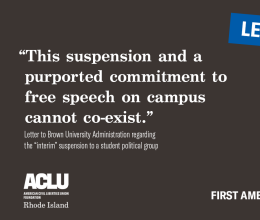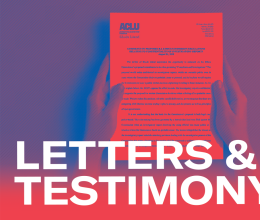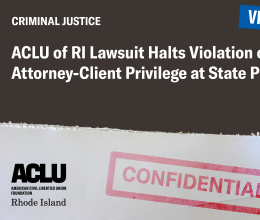Calling it “one of the most damaging decisions affecting the public’s right to know that has been issued, and a significant obstacle to holding police departments accountable,” the ACLU of Rhode Island has launched a two-pronged attack on a 2017 Attorney General ruling that allows police to keep secret some of its reports of police misconduct. In simultaneous appeals to the Rhode Island Supreme Court and the Attorney General, ACLU of RI cooperating attorney James Cullen is asking for a reversal of that ruling.
In two major Access to Public Records Act (APRA) lawsuits filed in past years by the ACLU, the R.I. Supreme Court has ruled that the public is entitled to obtain final reports of investigations of police misconduct. Although both cases involved requests for reports involving citizen-generated complaints of misconduct, the court rulings did not propound any distinction between investigations prompted by civilians and those initiated by a police department itself. However, a 2017 APRA advisory opinion by the Attorney General’s office, Piskunov v. Town of Narragansett, approved such a distinction and held in that case that the Narragansett Police Department could withhold their final reports of misconduct investigations if they were initiated internally. Until that ruling, police departments had routinely provided those reports. That quickly changed.
Later that year, the ACLU filed an APRA lawsuit against the Pawtucket Police Department on behalf of Dimitri Lyssikatos, who was stymied from obtaining those internally-generated police misconduct final reports. Lyssikatos is a member of the Rhode Island Accountability Project, a non-partisan organization which promotes governmental accountability and maintains a publicly available database of police misconduct reports. However, Pawtucket police, relying on the Piskunov opinion, refused to turn over 57 separate internal investigatory findings, prompting the ACLU to sue. In March, however, RI Superior Court Judge Melissa Long sided with the police and held that additional hearings were necessary to determine whether those records had to be released under APRA.
In a court brief filed today, the ACLU has asked the R.I. Supreme Court to review and overturn that decision, stating that Long’s ruling “invites public bodies to use unnecessary procedural hurdles to block APRA requests [and] imposes significant transaction costs that most applicants for the release of records cannot afford.”
Separately, Lyssikatos was denied access to similar records in April by the Woonsocket Police Department, which also relied on Piskunov in rejecting his request for misconduct reports. In response, ACLU attorney Cullen has filed with the Attorney General a formal appeal of that denial, asking that his office overturn its 2017 opinion. Calling the Woonsocket Police Department’s denial “a flagrant breach of Rhode Island’s Access to Public Records Act,” the appeal to the AG argues that it “highlights the faulty and problematic nature” of the 2017 opinion “which has become an increasingly-used tool by police departments to shield themselves from public accountability.” The formal appeal to the Attorney General concludes:
“The Piskunov opinion has cast a pall over police department accountability and transparency and is being used to hinder the public’s right to know in significant ways. We request that your office take this opportunity to reconsider and reverse that pronouncement, and conclude that the text and intent of the APRA . . . compel the conclusion that internally-generated reports regarding alleged police misconduct, no less than citizen-generated reports, are public records.”
In seeking the records from both Pawtucket and Woonsocket, Lyssikatos agreed, to no avail, to allow personally-identifiable information from the reports to be redacted.
ACLU cooperating attorney Cullen said today: “There is no meaningful distinction between internal affairs reports generated as a result of citizen complaints and internal affairs reports generated without an underlying citizen complaint. However initiated, these reports of investigations conducted by the internal affairs department shed light on one of the core functions of government – policing.”
Lyssikatos added: “The idea that internally generated investigations demand greater privacy than those initiated by the public only serves to foster the disconnect between the public and law enforcement. The Rhode Island Accountability Project was, and in some cases still is, receiving internally generated reports and feels strongly that their release is essential in maintaining a single standard of investigative integrity. As it stands now, all a law enforcement agency would have to do to withhold an investigation is beat the public to the initiation of the complaint.”
ACLU of RI executive director Steven Brown stated: “The 2017 Attorney General opinion is one of the most damaging decisions affecting the public’s right to know that has been issued, and a significant obstacle to holding police departments accountable. We are hopeful that the new Attorney General’s promise of greater transparency will lead to a reversal of that unfortunate opinion.”
Earlier this year, Judge Long upheld thousands of questionable redactions made by the previous Attorney General in releasing records regarding the AG’s expenditure of “Google settlement” funds. Those redactions included the complete blacking out of a two-page memo describing the Attorney General’s purchase of ceremonial lapel pins for the office. After the ACLU appealed that ruling, Attorney General Neronha reexamined the records and released almost all of them in unredacted form.
More information on the cases mentioned above, including copies of the filings, can be found here.







